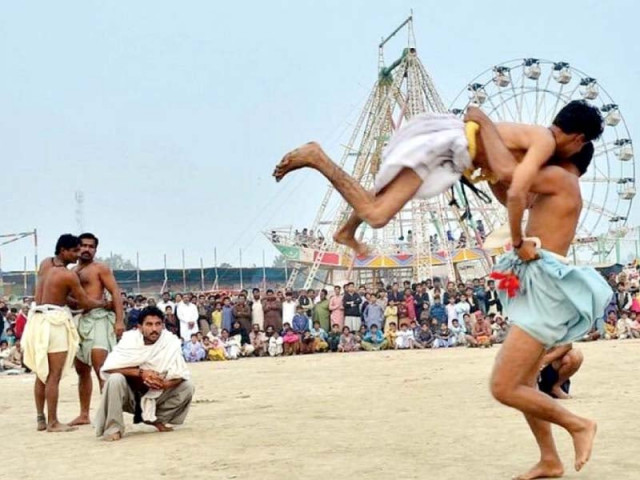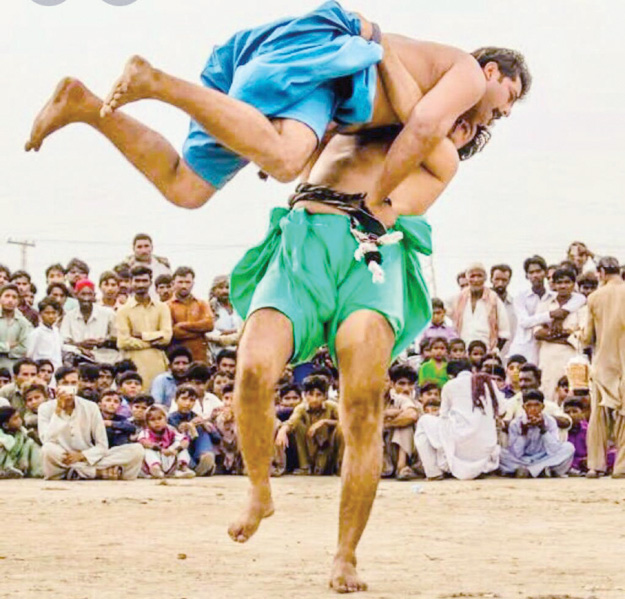Sweat and sand: Grappling with Sindh’s ‘contest of lions’
Even as Malakhro continues to excite the province, lack of official attention threatens the sport into extinction

Malakhro has historically been one of the most favourite sports in the province. The wrestler who wins the match is extolled by the crowd and is lifted on people’s shoulders to be paraded across the ground amid the loud beating of traditional drums. PHOTOS: EXPRESS
In Sindh, a flavour of the sport unique to the shores of the Indus survives till date in the form of Malakhro. Surprisingly, for the province’s rural population, no sport has managed to replace the excitement this millennia-old tradition continues to spark.
Each year, legions of enthusiasts customarily gather in fields to witness the spectacle and owing to the fierceness of the sport, locals often refer to the match as a ‘fight between the lions.’
Although the match is much like regular wrestling which involves two strong young men who try to pin each other to the ground, Malakhro is slightly more energetic and intense. Unlike other wrestling matches, Malakhro participants use a piece of twisted cloth that they throw at opponents to pull them by the waist and push them to the ground.
The wrestler who wins the match is extolled by the crowd and is lifted on people’s shoulders to be paraded across the ground amid the loud beating of traditional drums.
Through the ages
Malakhro, which is also known as ‘malh’ in Sindhi, has historically been one of the most favourite sports in the province. Men from each village in Sindh have been traditionally participating in the small-scale competitions that take place throughout the year.
Dejected Inam to miss World Wrestling Championship
Even though the sport carries historical importance and has been a great source of entertainment for people, it is gradually losing its value. Unlike the past when matches took place very often, they have now been confined to festivals of popular Sufi saints, including Shah Abdul Latif, Sachal Sarmast and Qalandar Lal Shahbaz, to name a few.
“If you go back and study the Indus Valley Civilisation, you can find evidence of many indoor and outdoor games including chess, bull racing and Malakhro,” former professor of archaeology and director Sachal Sarmast Chair, Shah Abdul Latif University Khairpur, Altaf Aseem told The Express Tribune.

Prof Aseem, who has extensively researched on Sindh’s traditional games, said that due to the negligence of successive governments, Malakhro has lost its importance because the department of culture did nothing to promote it.
“In the past, a particular musical band used to perform during a Malakhro match and the sport was part of people’s daily affairs in every nook and corner of Sindh. The age-old tradition, however, has been replaced with modern games like cricket and volleyball,” he said.
Prof Aseem added that the government usually provides a little stipend to artists, poets and writers to extend financial support to them but no one cares about Malakhro wrestlers.
“The government must take steps to promote this game and fix stipends for wrestlers too so that they are motivated to carry on the legacy of their forefathers,” he requested.
Shedding light on the game’s history, Molai Mallah, a writer who has written a book on traditional games in Sindh, referred to different clans and dynasties where Malakhro was common and said that the rulers of the Talpur Dynasty - which continued from 1783 to 1843 - promoted the sport in the states of Hyderabad and Khairpur by establishing training centres for the wrestlers.
“Sindh-wide competitions used to be held and wrestlers were categorised into three levels. The players of the first category would play at a national level, second-category players at a provincial level and the third-category players were given a chance to play at a local level,” he shared.
The stuff of legend
Mallah further explained that the ruler of Khaipur Mir Mir Ali Nawaz Talpur, Pakistan Peoples Party (PPP) founder Zulfikar Ali Bhutto’s brother Imdad Ali Bhutto, Makhdoom Muhammad Zaman Talib, Moula of Hala and the tribal chiefs of the Bijarani Community of Kashmore were among those who used to hold large-scale Malakhro matches in their respective areas.
“Nawabshah’s Ali Sher Mirbahar, also known as “Sher-e Sindh,” introduced some new features to the game and defeated players from India, Japan and Czechoslovakia,” he continued. “The then president of Pakistan, Ayub Khan, also attended the match which took place in Hala, Hyderabad in 1962.”
In lower Sindh, “Sheedi” players were famous and in upper Sindh, Mirbahar or Mallah who now call refer to themselves as Miranis, dominated Malakhro.
Bakhar Sheedi, Ghulam Sarwar Jatoi, Jumo Sheedi, Syed Saman Shah, Naban Jamali, Nooro Makhrani, Ali Mohammad Korejo, Ahmed Marri, Ghulam Qadir Leghari, Haji Khushk and Allah Juriyo Samon were among other popular Malakhro players.
'I came here, I played hard': Pakistani wrestler Inam wins gold at World Beach Games
A Malakhro wrestler named Muharam Majedano, who has participated in the match in different festivals, suggested setting up coaching centres for players.
“To revive the game, a once-in-a-year activity is certainly not enough. We have a lot of talent in Sindh and the government can promote the traditional wresting at an international level by imparting training to youngsters at a district level,” he said.
Speaking on promoting the game, special assistant to the chief minister of Sindh on sports Bungal Khan Mahar said that the provincial government has recently decided to promote Malakhro in the province.
“The Sindh government has decided to constitute committees on a divisional level to check the physical fitness of Malakhro pehlwans of the first, second and third category, and register them at a district level,” he said, adding that the department has also issued notifications to nominate conveners and members of the committees.
“Our committees will start working on promoting the game in all the six divisions and provide us with a list of people interested in the game,” he concluded.
Published in The Express Tribune, November 5th, 2019.


















COMMENTS
Comments are moderated and generally will be posted if they are on-topic and not abusive.
For more information, please see our Comments FAQ